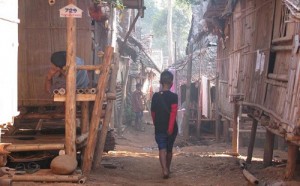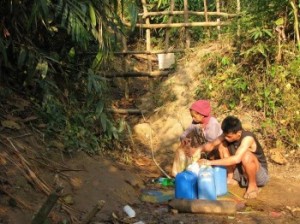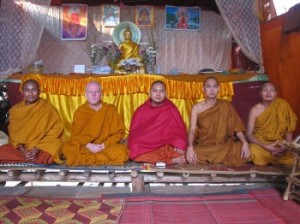“I want to go home. I want to see my parents.”
By The Best Friend • September 2, 2010 Life at Nu Po Refugee Camp. Nu Po Refugee Camp is located in an isolated part of Thailand six hours south of Mae Sot. The camp is sometimes called ‘Noh Poe’, which means ‘small lake’ in Karen. Almost 15,000 people live here. Most of the residents of the camp are Karen who have left their own state in Burma due to the long-standing civil war. Many others are monks who fled Burma following the Saffron Revolution of 2007. Another significant segment of the population is comprised of former political prisoners, who come for refuge after they escape across the border to Thailand.
Life at Nu Po Refugee Camp. Nu Po Refugee Camp is located in an isolated part of Thailand six hours south of Mae Sot. The camp is sometimes called ‘Noh Poe’, which means ‘small lake’ in Karen. Almost 15,000 people live here. Most of the residents of the camp are Karen who have left their own state in Burma due to the long-standing civil war. Many others are monks who fled Burma following the Saffron Revolution of 2007. Another significant segment of the population is comprised of former political prisoners, who come for refuge after they escape across the border to Thailand.
Buddhist monk Ashin Kesara has been living in Nu Po since December 2007. He had to flee his homeland. He felt he was in danger because it was discovered by the authorities that he had been actively working with U Gambira during the preliminary days of the Saffron Revolution. When he finally arrived in the border town of Mae Sot in Thailand, he was rejected by the local monasteries. Thai monasteries rarely accept Burmese monks due to fear of complications. An NGO he consulted recommended Ashin Kesara come to the refugee camp.
Like many others, he arrived here scared and alone. There was no one to show him what to do. In order to get a sleeping place at one of the monasteries inside Nu Po, he had to work hard chopping wood and carrying drinking water from the mountain to the monastery. It is the only way to have even passably clean water. The streams that run under the bamboo houses of the camp are filled with waste and contaminated with feces.
 One can rarely find a concrete lavatory. Most of the toilets at Nu Po are made of packed mud. The people have no alternative to dumping the water they use directly into the runnels that flow under the houses. In the rainy season, like now, the runnels form one big lake. “Many people are ill now”, he tells me. Flu and fever are prevalent. The only drinking water available at the moment contains too much limestone. It turns white when boiled.
One can rarely find a concrete lavatory. Most of the toilets at Nu Po are made of packed mud. The people have no alternative to dumping the water they use directly into the runnels that flow under the houses. In the rainy season, like now, the runnels form one big lake. “Many people are ill now”, he tells me. Flu and fever are prevalent. The only drinking water available at the moment contains too much limestone. It turns white when boiled.
Many people told me their stories while we sat in the dark. Even though the camp has electricity and every hut has at least one light bulb, there are no light switches. The lights usually turn on automatically from 7 until 9 in the evening, but the electricity is not stable. It often goes out every few minutes.
It took almost two years after his initial request until Ashin Kesara was finally granted an interview with Thai Immigration. He was interviewed for two hours, but now finally has a UN registration number. Having to wait a minimum of four years to get official recognition as a refugee is normal. When I visited the camp in March 2010, the feeling of hopelessness and frustration among the people was overwhelming. There are constantly floating rumors from the Thai authorities and from the UNHCR staff about a possible resettlement “next month”, or “maybe next year”.
Most people are very depressed because the situation remains stagnant year after year. The different ethnicities and religious groups keep to themselves. Large problems exist between members of the KNLA and the KNU, two different Karen organizations, who are living in separate areas of the camp but still have to deal with each other.
All of this—the poor conditions in the camp, the frustration and feelings of futility experienced by the residents, the strain on the Thai authorities—is the direct result of the ongoing war inside Burma. Ashin Kesara does not see any hope for improved conditions as long as Burma remains in the grip of the current regime. As long as the military regime in Burma is in power, there will be no positive change to this.” He also doesn’t hold out any hope for the upcoming elections. “They’re fake”, he says.
 Ashin Kesara also tells of corruption that is rampant on the part of the Thai authorities and staff of UNHCR. One can buy a wide assortment of goods inside the camp, but they are much more expensive than outside. The authorities charge high taxes for everything sold on the small market. Internet shops and telephones are also overpriced. Because there is no work in the camp, most people have no money to buy these things anyway.
Ashin Kesara also tells of corruption that is rampant on the part of the Thai authorities and staff of UNHCR. One can buy a wide assortment of goods inside the camp, but they are much more expensive than outside. The authorities charge high taxes for everything sold on the small market. Internet shops and telephones are also overpriced. Because there is no work in the camp, most people have no money to buy these things anyway.
A lot of bribery and discrimination also exists. Ashin Kesara explains that many Christian missionaries are currently in the camp, seeking to convert people of other religions. “Refugees who become Christians can get a faster resettlement.”
Despite all the hardships the people face in the refugee camp, Ashin Kesara, like many others I met, is making the best of the situation. Although he has no proper classroom at the moment, he teaches an English class of 41 students, as well as a computer course with a MacBook a friend donated to him. He wants to build a schoolhouse for the classes, but cannot do it without first raising donations.
He really wants to leave the camp, and is still hoping for resettlement to a third country. “But actually”, he says, “I want to go home. I want to see my parents.” For him and for the thousands of other refugees from Burma now living in Nu Po, there is no way to go back home, as long as the current regime in Burma stays in power.
To make a donation to Ashin Kesara’s project to build a school at Nu Po, or to see more photos, please visit theBestFriend.org
Tags: Ashin Kesara, Nu Po Refugee Camp, Refugees, The Best FriendThis post is in: Blog
Related Posts








 All posts
All posts